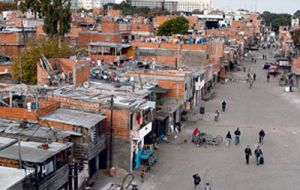MercoPress. South Atlantic News Agency
A third of metropolitan Buenos Aires live below poverty line claims Catholic Church
 Shanty towns next to Buenos Aires main train station
Shanty towns next to Buenos Aires main train station Over a third of metropolitan Buenos Aires, 34.9%, live below the poverty line which is equivalent to 4.4 million people, more than double the official Argentine government estimate, according to a paper from the Argentine Catholic University, UCA, and the local Caritas chapter from the Catholic Church.
The official stats office Indec figure says that the poverty condition affects 15.2% of the population from the Argentine capital and thirty adjoining townships.
The discrepancy points out UCA stems from the different definition of poverty: for the Argentine government families with an income below 1.250 Pesos (equivalent to 292 US dollars) are considered poor while in the report, and for the Argentine Catholic Church the line is 2.150 Pesos, approximately 502 dollars.
The UCA-Caritas report is based on 1.722 interviews which also show that 10.8% of the 12.8 million people in that geographical area live in shanty towns, most of them with no access to basic services such as drinking water and sewage.
Another 54.7% of residents in the Argentine capital and the surrounding thirty townships which are included in the paper and belong to the province of Buenos Aires (the largest and richest of the country) claim they lack police protection and one out of three over 18 claim to have been victims of some sort of crime in the last twelve months.
The paper which was released a few days after the Argentine Catholic Church renewed its authorities refers to the area most densely populated of the country which has a total population of 40 million.
However poverty in Argentina has been diminishing sustainedly from a 57.5% extreme index in October 2002 in the midst of the melting of the economy and a major default on its sovereign debt, considered one of the worst of the country’s recent history.
According to the controversial Indec poverty, among the Argentine urban population, that is in the 31 most densely populated districts of the country was 8.3% during the first quarter of 2011, which represents a drop of 3.7 percentage points compared to the same period a year ago.




Top Comments
Disclaimer & comment rules-

-

-

Read all commentsThe Catholic Church is a strong proponent of Socialism. Socialism and totalitarian government has led to this poverty. Maybe we should get rid of the Catholic Church, it might alleviate poverty.
Nov 21st, 2011 - 03:55 pm 0I wonder if they feel as rich? Doesn't everyone feel rich in Argentina? Or maybe that is just the people profiting from the current government?
Nov 21st, 2011 - 04:15 pm 0Seriously, I would believe this report over any 'official' figures given by the Argentine government. It is more in line with what one sees and experiences if you visit Bs As; away from the tourist destinations.
It is good news that things have improved since 2001. How could they not?
A shanty town, a place that Cristina never visits, but she loves the Champs Élysées heehee
Nov 21st, 2011 - 05:09 pm 0Commenting for this story is now closed.
If you have a Facebook account, become a fan and comment on our Facebook Page!